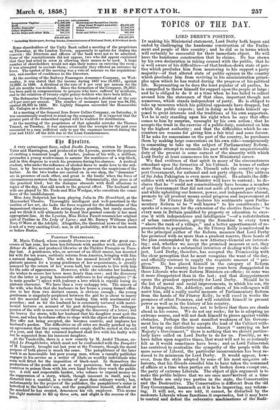it4t 4t1Ltrts.
A very extravagant farce, called .Double Dummy, written by Messrs. Yates and Harrington, and produced at the Lyceum, answers the purpose of exciting a transient laugh. A barber, jealous of his wife, a milliner, • persuades a young workwoman to assume the semblance of a wig-block, and in this disguise to watch his premises during his absence. A medical student, who under the influence of alcohol dares to make love to the mil- liner, is by her accoutred as a lay-figure to prevent the suspicions of the barber. As the two trades are carried on in one shop, the dummies" are in presence of each other,' and great is the bustle when the force of circumstances restores them to animation. Substantially, this piece is of the practical kind ; but the dialogue abounds with droll allusions to topics of the day, that add much to the general effect. The husband and wife are played by Mr. Toole and Miss Woolgar, who constitute the comic force of the establishment.
Miss Amy Sedgwick has been playing Julia in The Hunchback, at the Haymarket Theatre. Thoroughly intelligent and well-practised in the • routine of her art, she lacks the force required for the delineation of this impassioned character. Her acting always gratifies, but rarely startles and we think it will ultimately be found that genteel comedy is her most appropriate line. At the Lyceum, Miss Helen Faucit resumes her original part of Pauline in The lady of Lyons and Mr. Barney Williams plays Rory 0' More at the Adelphi. Altogether, the theatrical news of the week is not of a very exciting kind ; nor, in all probability, will it be much more so before Easter.
PARISIAN THBATELIC.ALS.
M. Mario Uchard, whose comedy .Fiammina was one of'the great suc- cesses of last year, has been less fortunate with another work, entitled Le Itetour du Hari, and produced likewise at the Theatre Francais on Tues- day last. A gentleman, who, on account of an illicit amour, has deserted his wife for ten years, suddenly returns from America, bringing with him a natural daughter. The wife, who has amused herself with a purely platonic passion for a young gentleman of her acquaintance, is greatly annoyed by the return of her worse half, but consents to live with him for the sake of appearances. However, while she tolerates her husband, she wishes to secure her lover more firmly than ever; and the discovery that the latter is paying honourable addresses to her stepdaughter (" de la main gauche") spices with jealousy a love which is rapidly losing its platonic character. We have thus a very unhappy trio. The misery of the wife' who feels that she harbours in her house a young damsel offen- sive to her from two distinct causes, is obvious enough ; the young gentleman is singularly perplexed between the girl he is about to marry and the married lady who is ever loading him with sentimental re- preaches; and as for the husband he is constantly tortured with matri- monial lectures on account of his past delinquencies. The unhappy passion of the wife is soon revealed through the discovery of a letter; but she braves the storm tells her husband that his daughter must quit the house, and when he refuses offers to elope with the object of her affections. Her offer not being accepted, she becomes contrite, and implores her husband's pardon. The difficulties on all sides are finally patched up by an agreement that the young unmarried couple shall be united at the end of a year, and that the returned husband shall live with his faulty wife but be separated from his innocent daughter. At the Vaudeville, there is a new comedy by M. Andre Thomas, en- titled Le Pamphletaire, which mita not be confounded with the Pamphlet of M. Legouve, brought out last year at the Francais, though the moral Purpose of both pieces is much the same. The pamphleteer of the later work is an honourable but poor young man, whom a rascally publisher engages in hervice as a writer of libels on wealthy individuals who seem well fitted for the imposition of black-mail. In themselves the Productions of the youth are not so very pernicious, but the publisher contrives to poison them with his own hand before they reach the public eye. A rich and respectable banker, who refuses to expend money on the suppression of a story, which, though innocent in itself, may be distorted into a scandal, is a victim of more than ordinary worth ; but, unfortunately for the project of the publisher, the pamphleteer's sister is betrothed to the banker's son, and the pampkleteer himself; shocked at the mischief he has created, denounces his vile employer. This seems but slight material to fill up three acts, and slight is the success of the Piece. ,


































 Previous page
Previous page